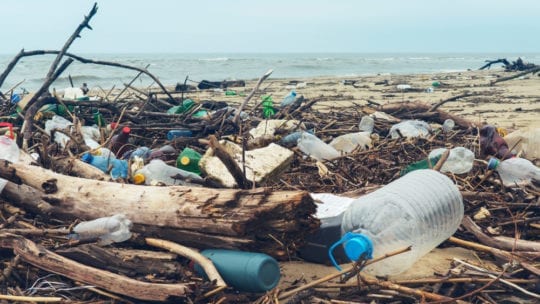
The modern consumer holds a world of information at their fingertips. They can research companies to the finest minute detail—including working conditions and the CEO’s latest political contributions. Younger generations hold companies accountable, and want to make purchases with those that uphold an authentically purposeful agenda surrounding their products and promotion.
Brands such as Warby Parker and TOMS found success in the buy one-give one strategy. Buy one pair of shoes, and TOMS gives a pair to those in need. Same for Warby Parker with glasses. Consumers like to know that even while they indulge in making a purchase, they are also contributing to a greater cause.
PepsiCo Makes a Switch
In response to the growing concerns about plastic flooding our oceans and piling up in landfills, PepsiCo announced a switch in its bottling. Aluminum cans will now replace plastic bottles for Bubly sparkling water and Aquafina water. According to the Aluminum Association, 75 percent of all the aluminum ever produced in the U.S. is still in use today.
Coming in 2020: The beverages you love, in more sustainable packaging:
? 16oz cans replace plastic bottles @bublywater
? 100% recycled bottles @LIFEWTR
? Aluminum cans @Aquafina
Part of our vision to build a world where plastics need never become waste: https://t.co/tZuKUdwBHc pic.twitter.com/jhBP9voez1— PepsiCo (@PepsiCo) June 27, 2019
PepsiCo recognized its role in contributing to the plastic crisis and decided to take a stand, to become more sustainable for their younger and future customers.
“As one of the world’s leading food and beverage companies, we recognize the significant role PepsiCo can play in helping to change the way society makes, uses, and disposes of plastics,” said PepsiCo Chairman and CEO Ramon Laguarta, in a statement. “We are doing our part to address the issue head on by reducing, recycling and reinventing our packaging to make it more sustainable, and we won’t stop until we live in a world where plastics are renewed and reused.”
Consumers can essentially become a partner in the sustainability movement by choosing a PepsiCo product with these packaging standards. PepsiCo makes it an easy way to show support for a cause, without a customer really having to change his or her purchasing habits.
Unless they shift from a competitor brand to Pepsi products because of the sustainability policies, out of a desire to support a company that coincides with their ideals. That’s a win-win.
Who needs a bottle, anyway?
More governments, restaurants, workplaces and organizations are banning single-use plastic, so you may have noticed everyone carrying brightly colored reusable water bottles everywhere. Yeti and Swell have almost become status symbols, keeping drinks cool for hours, while creating vessels that reflect personality.
In 2016, Pepsi rival Coca-Cola launched Dasani PureFill stations across the country at college campuses. Since determining the program a success, Coca-Cola plans to expand this year to more schools, zoos and aquariums. Bottled water currently reigns as America’s most popular drink, overtaking soda in 2016. So yes, Coke had to make a move. Pepsi also tested a similar system and plans to rival PureFill in the coming year, reaching out to offices, hotels and stadiums.
Interactive water coolers allow users to choose their own flavors, temperature and carbonation levels. Coca-Cola’s model also offers a free chilled water version, possibly inciting an additional rivalry with the classic drinking fountain. The opportunity to allow consumers to choose their own beverage path and fill their own vessels with a personalized drink gives them more purchasing freedom. When companies make it easy for people to change their habits and contribute to a better outcome, they may be more likely to. It empowers consumers and grants them an authentic opportunity to become part of the solution, without being pushy or patronizing.
